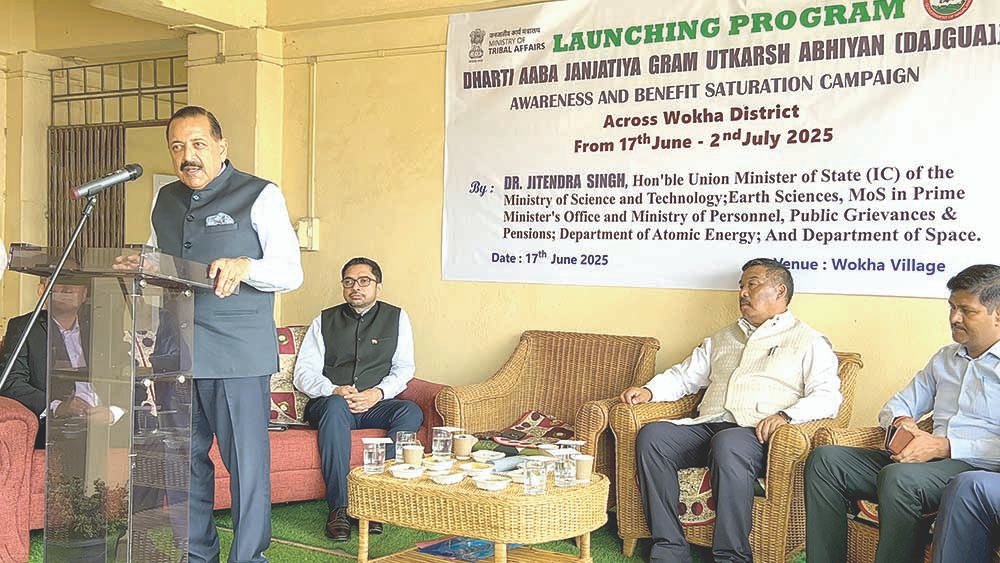Union Minister of State MoS) for Science & Technology, Earth Sciences, and Prime Minister’s Office Dr Jitendra Singh officially launched the Dharti Aaba Janjatiya Gram Utkarsh Abhiyan (DAJGUA) at the Multi-Purpose Hall, Wokha village, on Tuesday.
He was accompanied by legislator Y Mhonbemo Humtsoe and adviser to chief minister Dr Chumben Murry. To be carried out across Wokha district till July 2, the campaign will cover 53 villages divided into seven blocks. Various developmental activities will be conducted in each block during the campaign period.
The DAJGUA is a nationwide initiative aimed at extending government schemes and welfare programmes to tribal communities. The programme will cover 549 districts across India. Through this campaign, villagers will have access to multiple government schemes, welfare projects, and development initiatives under different departments.
Addressing the gathering, Singh highlighted the significant transformation witnessed in the Northeast over the past decade, comparing it with earlier times when basic infrastructure like roads and airports were largely absent. He credited this change to the focused efforts of the present government under Prime Minister Narendra Modi, pointing out that the Prime Minister had visited the region over 70 times since taking office. He claimed that Nagaland was now partners in progress.
Speaking specifically about Nagaland, the MoS recalled the contribution during the 19th-century freedom fighter from the region in resisting British incursions, emphasising Nagaland’s historic role in India’s independence movement.
He lauded the resilience and contribution of the people of Nagaland to India’s growth journey, asserting that the Northeast, especially states like Nagaland, would continue to play a pivotal role in India’s emergence as a global power in the coming decades.
Highlighting Wokha’s rich biodiversity and calling it “the land of plenty,” Singh remarked that if the abundance of Wokha could be distributed across the country, India as a whole would become richer. He alleged that lack of attention from past governments left the region underutilised, assuring that the current government was committed to realising its full potential.
He disclosed that he had discussed key issues with local legislators, including the need for improved highways and addressing other local grievances. He assured that efforts would be made to integrate technology with local enterprises, particularly by promoting technology-driven start-ups in the fruit and food processing sectors under the One District One Product (ODOP) initiative. He suggested that the Ministry of Development of North Eastern Region (DoNER) contribute towards constructing a legislative assembly building in Nagaland.
Encouraging local youth to embrace technology-driven agriculture and innovation, he highlighted the potential for start-ups in areas like fruit production, food production and sustainable enterprises.
He also encouraged formation of women self-help groups (SHGs), describing women as the backbone of rural communities and essential stakeholders in India’s development. He pointed out that women from the Northeast had consistently led and excelled in various fields, adding that the rest of the country could learn from this example.
Referring to India’s growing economic stature, Singh appreciated the country’s emergence as the world’s fourth-largest economy and expressed hope for further progress in the years ahead. He also expressed optimism that the ongoing 15-day campaign would help achieve saturation of several flagship government schemes, ensuring greater access to welfare initiatives for the people of Nagaland.
He concluded by saying that the barriers of the past were over, calling it one of the biggest achievements of recent years.
The MoS also visited the stalls set up by various departments, interacted with locals officials, and shared his suggestions on improving and promoting local produce. He also distributed quality planting materials to the farmers.
On the occasion, the Wokha Village Council (WVC) submitted a representation to the MoS, urging upgradation of the Government High School (GHS), Wokha village to Government Higher Secondary School (GHSS).
According to the representation, the proposal for upgradation was officially approved by the Wokha District Planning & Development Board (DPDB) during its meeting on November 21, 2022. Despite the approval and subsequent submission to the Government of Nagaland, the WVC lamented that no substantial progress had been made to date.
The council, on behalf of the general public of Wokha village, expressed concern over the delay, stressing that the upgradation was essential to meet the growing educational needs of the students in the area. It also pointed out that the absence of a higher secondary school had been a long-pending issue faced by the community, forcing students to seek admission in schools outside the village, often at great financial burden to their families.
The WVC appealed for personal intervention of the Union Minister concerned and other relevant authorities to ensure that the proposal received a favourable consideration.
Wokha Village Students’ Union president Chipen Kikon said the minister’s visit reflected unity between local communities and national leadership. He highlighted challenges like poor road condition, limited access to higher education, and rising unemployment, while appealing for upgradation of the GHS, Wokha village to GHSS.
He stated that Wokha village with a population of 4,966 has 1,215 students across different academic levels, stressing that investing in education was key to securing the state’s future.
Union minister launches DAJGUA at Wokha
CorrespondentWOKHA, JUN 17 (NPN)

